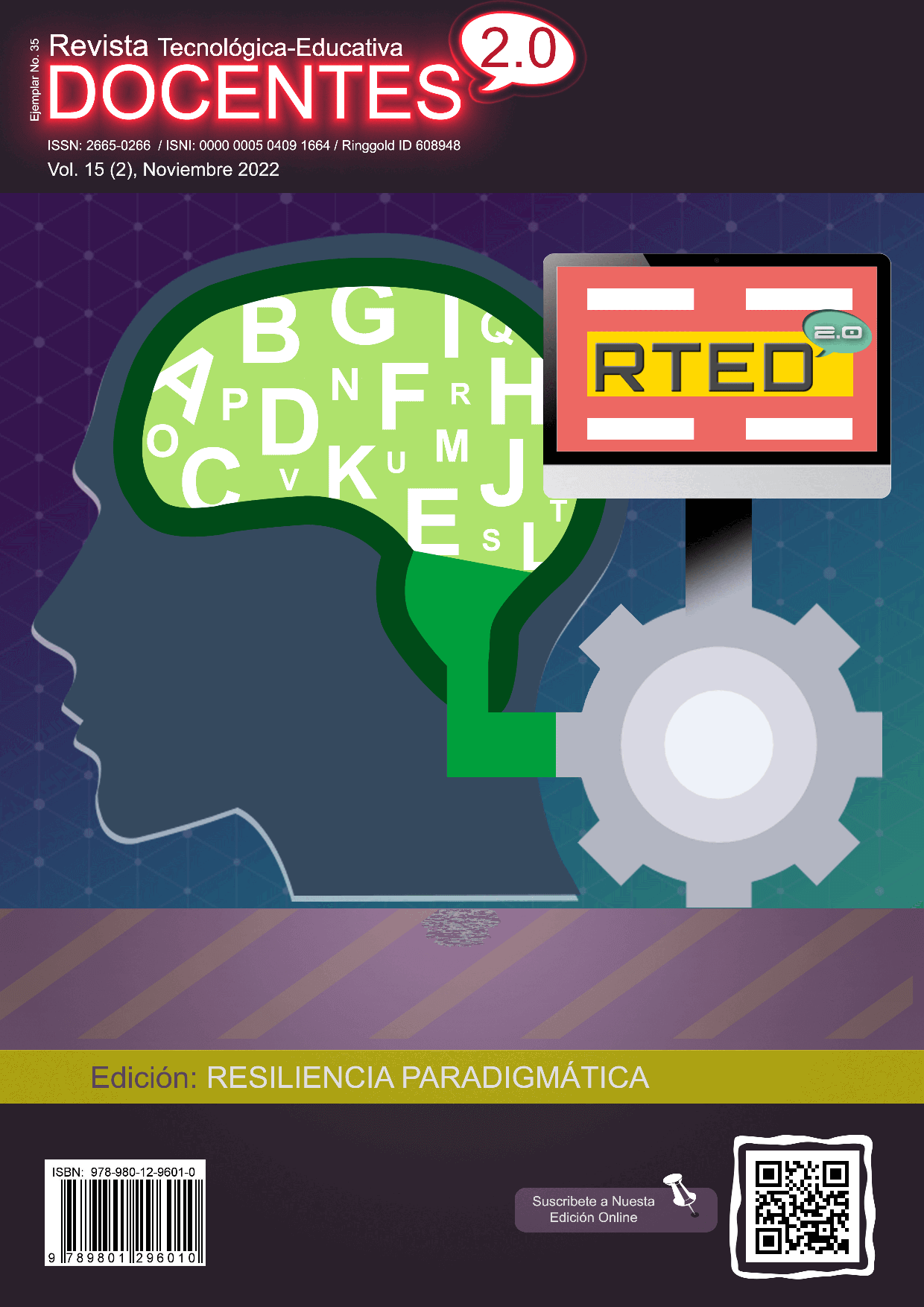Use of Moodle and Microsoft Teams in Learning English as a Foreign Language
 DOI:
https://doi.org/10.37843/rted.v15i2.315
DOI:
https://doi.org/10.37843/rted.v15i2.315
Main Article Content
Abstract
Technology has been gaining prominence because it currently allows processes to occur at any time, facilitating access to a more significant number of learners. The objective of this research was to assess the use of Moodle and Microsoft Teams in designing an Anglophone literature course, favoring the development of writing in learning English as a foreign language through the flipped classroom modality at the university level. The research method was analytical-synthetic under a pragmatic paradigm, with a mixed approach of an exploratory type following a sequential exploratory design. The study was carried out with ninth-semester students. Among the instruments used, a survey was applied to the students, obtaining quantitative data. Interviews were conducted with English teachers and experts using platforms, reaching qualitative data. Likewise, two focus groups were applied. The results were the following: the use of educational platforms effectively provides benefits to the academic community since it is an alternative that offers the possibility of exchanging material, promotes autonomy, feedback, interaction, and collaborative work; facilitates the work of the teacher by obtaining a more active learner, among others. These resources make writing possible due to functions such as the forum, chat, shared documents, peer correction, etc. In addition, supported by the flipped classroom model, it is a feasible option that strengthens virtual education.
Downloads
Metrics
Article Details

This work is licensed under a Creative Commons Attribution-NonCommercial-NoDerivatives 4.0 International License.
Those authors who have publications in our journal accept the following terms:
- When a work is accepted for publication, the author retains rights of reproduction, distribution of his/her article for exploitation in all countries of the world in the format provided by our magazine and any other magnetic medium, optical, and digital.
- Authors will retain their copyright and guarantee the journal the right first to publish their work, which will be simultaneously subject to the Creative Commons Acknowledgment License (Attribution-NonCommercial-NoDerivatives 4.0 International (CC BY-NC-ND 4.0)). That allows third parties to copy and redistribute the material in any medium or format, under the following conditions: Acknowledgment - You must properly acknowledge authorship, provide a link to the license, and indicate if any changes have been made. You may do so in any reasonable way, but not in a way that suggests you have the licensor's endorsement or receive it for your use. NonCommercial - You may not use the material for a commercial purpose. NoDerivatives - If you remix, transform, or build from the material, you cannot broadcast the modified material. There are no additional restrictions - You cannot apply legal terms or technological measures that legally restrict you from doing what the license allows.
- Authors may adopt other non-exclusive license agreements to distribute the published version of the work (e.g., deposit it in an institutional archive or publish it in a monographic volume) provided that the initial publication in this journal is indicated.
- Authors are allowed and recommended to disseminate their work through the Internet (e.g., in institutional telematic archives, repositories, libraries, or their website), producing exciting exchanges and increasing the published work's citations.
- Request of withdrawal an article has to be done in writing by the author to the Editor, becoming effective after a written response from the Editor. For this purpose, the author or authors will send correspondence via e-mail: [email protected].
- The author will not receive financial compensation for the publication of his work.
- All Docentes 2.0 Journal publications are under the Open Journal System (OJS) platform at: https://ojs.docentes20.com/.
References
Beatty, K. (2003). Teaching & researching: Computer Assisted Language Learning Longman.
Brown, D. (2007). Teaching by principles: An interactive approach to language pedagogy. Pearson Education.
Clarenc, C. A., Castro, S. M., López de Lenz, C., Moreno, M. E. & Tosco, N. B. (2013). Analizamos 19 plataformas de e-Learning: Investigación colaborativa sobre LMS. Grupo GEIPITE, Congreso Virtual Mundial de e-Learning. www.congresoelearning.org.
Domínguez, J. (2010). La Plataforma Moodle: una herramienta de aprendizaje útil y necesaria en el Espacio Europeo de Educación Superior. Research Gate, (1) 129-146. https://www.researchgate.net/publication/236202460_La_Plataforma_Moodle_una_herramienta_de_aprendizaje_util_y_necesaria_en_el_Espacio_Europeo_de_Educacion_Superior
Dudeney, G., & Hockly, N. (2007). How to teach English with technology. Pearson/Longman. DOI: https://doi.org/10.1093/elt/ccn045
Esquivel, I., Martínez, W., & Martínez-Castillo, J. (2014). Aula Invertida o Modelo invertido de aprendizaje: origen, sustento e implicaciones. Research Gate, (1),143-160. https://www.researchgate.net/publication/273765424_Aula_Invertida_o_Modelo_Invertido_de_Aprendizaje_origen_sustento_e_implicaciones
Feria, K. (2019) Aplicación del modelo pedagógico Flipped Classroom para le enseñanza aprendizaje de la gramática en inglés en los estudiantes de intermedio de la Universidad Católica de San Pablo, Arequipa. http://repositorio.unsa.edu.pe/handle/UNSA/9436
Góngora, Y., & Martínez, O. (2012). Del diseño instruccional al diseño de aprendizaje con aplicación de las tecnologías. Teoría de la Educación. Educación y Cultura en la Sociedad de la Información, 13(3), 342-360. https://www.redalyc.org/articulo.oa?id=201024652016 DOI: https://doi.org/10.14201/eks.9144
Guerrero, R., Lenise do Prado, M., & Ojeda, M. (2016). Reflexión crítica epistemológica sobre métodos mixtos en investigación de enfermería. Enfermería Universitaria, No. 13(4),246–252. http://dx.doi.org/10.1016/j.reu.2016.09.001 DOI: https://doi.org/10.1016/j.reu.2016.09.001
León, G. (2014). Aproximaciones a la mediación pedagógica. https://investiga.uned.ac.cr/revistas/index.php/revistacalidad/article/view/348/249
Hernández-Sampieri, R., Fernández-Collado, C., & Baptista-Lucio, P. (2014). Metodología de la investigación (6a. ed.). McGraw-Hill.
Patchler, N. (2014) Perspectives on theories of learning with digital technology. In M. Leusk and N. Patchler, (Eds) Learning to teach using ICT in the secondary school: A companion to school experience (pp. 25-33) Routledge.
Peachey, N. (2020). The Flipped Classroom for English Language Teaching. Oxford University http://fdslive.oup.com/www.oup.com/elt/feature/oup-focus-flipped-classroom.pdf
Ministerio de Educación Nacional (2016). Por la cual se establecen las características específicas de calidad de los programas de Licenciatura para la obtención, renovación o modificación del registro calificado. Resolución 02041. https://www.mineducacion.gov.co/1759/articles-356982_recurso_1.pdf
Richards, J., & Rodgers, T. (1998). Enfoques y métodos de la enseñanza de idiomas. Cambridge University Press.
Rodríguez, A., & Pérez, A. O. (2017). Métodos científicos de indagación y de construcción del conocimiento Revista EAN, 82, pp.179-200. https://doi.org/10.21158/01208160.n82.2017.1647 DOI: https://doi.org/10.21158/01208160.n82.2017.1647
Universidad Complutense de Madrid (2020). Microsoft Teams: Manual de uso. https://www.ucm.es/data/cont/media/www/faq/31//TutotialMICROSOFT TEAMS_v2_0.pdf






